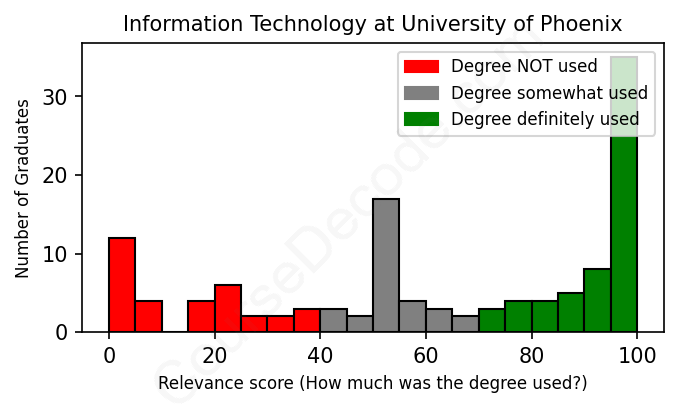
First, some facts. Of the Information Technology graduates from University of Phoenix we've analyzed , here's how many have used (or NOT used) their degree in their career:

These are estimates based on AI analysis of 123 LinkedIn profiles (see below).
The verdict? Below average. Overall, with an average relevance score of 61%, Information Technology graduates from University of Phoenix have a lower likelihood (-6%) of finding work in this field compared to the average graduate across all fields:
And for comparison, here's the chart for all profiles we've looked at across all degrees.
Also, after graduating, only 18% of these graduates have pursued further education other than another Bachelor's degree (such as a Masters degree or other), compared to the average across all profiles of 35%. This suggests a Bachelors degree is enough for most Information Technology graduates, and it's normal to look for work straight after graduation.
See the details:
|
Relevance score: 100% We think this person has gone into a career highly relevant to their degree. We think this person has gone into a career highly relevant to their degree.
DEGREE INFOGraduated in 2021 from University of Phoenix with a Bachelor of Science - BS in Information Technology. No other secondary education since. JOB HISTORY SINCE GRADUATIONInformation Technology Administrator Computerized Management Svc Mar 2022 - Present ABOUTNo information provided. |
The top 10 most common jobs done by the graduates we've analyzed (ranked most common to least) are:
Based on the information gathered from LinkedIn profiles of individuals who graduated with a degree in Information Technology from the University of Phoenix, it’s clear that there are a variety of job roles these alumni have pursued. While some of these roles directly reflect the skills and knowledge gained during their studies, others might seem a bit out of place within the IT framework. The most common job titles observed include IT Manager, Systems Administrator, Software Engineer, and Technical Support roles, which highlight a strong connection to the field of Information Technology.
For many graduates, roles such as IT Manager, Systems Administrator, and Software Engineer are directly relevant to their degree. These positions typically involve responsibilities like managing IT projects, maintaining systems, and developing software solutions, which not only require foundational knowledge in information technology but also rely heavily on the technical skills learned during studies. This indicates that a significant portion of graduates are able to utilize their education in meaningful ways within the tech industry.
However, it is essential to note that not all job titles align closely with the Information Technology field. Several alumni have taken roles in areas such as sales, customer service, or management that seem only tangentially related to IT. For instance, positions like Regional Account Manager or roles focused on logistics do not fundamentally harness the core IT skills that one would expect from a graduate with an IT degree. These positions illustrate a broader trend where some graduates may be leveraging their degree for opportunities outside traditional IT roles, which might not fully utilize their specialized skill set.
In summary, while a significant number of graduates have found roles that are strongly tied to their Information Technology degree, there is a notable presence of alumni in positions where the relevance to their studies is less clear. This suggests that while the degree provides a solid foundation for technical roles, some graduates are also adaptable enough to branch out into other areas of business and management. Overall, the versatility of a degree in Information Technology seems to open many doors, even if some paths taken diverge from the core competencies of the field.
Here is a visual representation of the most common words in job titles for Information Technology graduates (this is across all Information Technology graduates we've analyzed, not just those who went to University of Phoenix):

So, let’s dive into the career trajectories of graduates from the University of Phoenix who studied Information Technology. Looking over the data, it’s clear that many of these graduates are stepping into related fields right after graduation, and have continued climbing the ladders in various tech roles as they progress in their careers.
For many of the 2010 and 2011 graduates, their first jobs tend to be pretty standard for someone entering the IT world. Positions like IT Manager, Support Engineers, Network Engineers, and Technical Support roles are commonly seen within the first few years post-graduation. This shows that they are at least getting their foot in the door in tech departments and gaining the necessary experience in a relatively short timeframe. Fast-forwarding five to ten years later, we can see a notable trend where many people have taken on more advanced, managerial, or specialized roles. For example, individuals have moved into positions such as IT Consultant, Scrum Master, and even Director of Managed Services or Solutions Architect, which indicates a positive trajectory in their careers.
However, it's not all sunshine and rainbows. Some graduates have found themselves in roles that are somewhat disconnected from their IT backgrounds after several years. A few have shifted into non-tech roles, like store management or customer service. Also, it seems that some individuals didn't find sustained employment in tech right after graduation or had rather shaky transitions that led to employment not directly related to their degree. When you look at the very latest graduates from 2022 and even some from 2021, many are still starting out in entry-level positions, likely navigating a more crowded job market post-COVID.
Overall, though, a solid chunk of these alumni from the University of Phoenix appears to have progressed towards satisfying careers that utilize their Information Technology degrees. They’ve moved into roles that align more closely with their studies, which is always a good sign. If you’re looking to pursue a tech career, this makes a pretty strong case for the pathways you might expect your fellow graduates to embark on after finishing their degree.
Honestly, getting a Bachelor’s degree in Information Technology can be a mixed bag. It can be challenging at times, especially when you dive into subjects like programming, networking, or database management, but a lot of it also depends on your background and interest in tech stuff. University of Phoenix has a reputation for being pretty flexible and supportive, which can make it easier for some students to manage their studies alongside other responsibilities. Overall, while it might be tougher than some other majors if you’re not super into tech, it’s definitely doable with some commitment and effort!
Most commonly, in the LinkedIn profiles we've looked at, it takes people 2 years to finish a Bachelor degree in Information Technology.
Looking at the job trajectories of these University of Phoenix grads, it seems like many have found decent positions in the IT field, which usually pays pretty well. For example, a lot of them have roles like IT Managers, Systems Engineers, and even Software Engineers, all of which are known for offering solid salaries. People who have worked at larger companies like Microsoft and Apple tend to enjoy good pay, and roles like Network Engineer and Project Manager often bring in a hefty paycheck as well. The fact that some folks have transitioned into senior roles, such as Senior Managing Director or Director positions, suggests they are earning quite a bit, too.
However, not everyone seems to be cruising at high altitudes. Some individuals have taken on roles that are more entry-level or mid-tier, like help desk technicians or service desk engineers, which might not have the same earning potential. And some have even moved between different fields and had periods of unemployment, which can definitely impact their financial stability. Plus, those starting just recently—like the graduates from 2022 and 2023—might still be in the growth phase of their careers. Overall, while many of these grads are likely making decent money, it really depends on the specific roles they’ve landed and how far they’ve climbed in their company ladders.
Here is a visual representation of the most common words seen in the "about" section of LinkedIn profiles who have a Bachelor degree in Information Technology (this is across all Information Technology graduates we've analyzed, not just those who went to University of Phoenix). This may or may not be useful:

Here are all colleges offering a Bachelor degree in Information Technology (ordered by the average relevance score of their Information Technology graduates, best to worst) where we have analyzed at least 10 of their graduates: